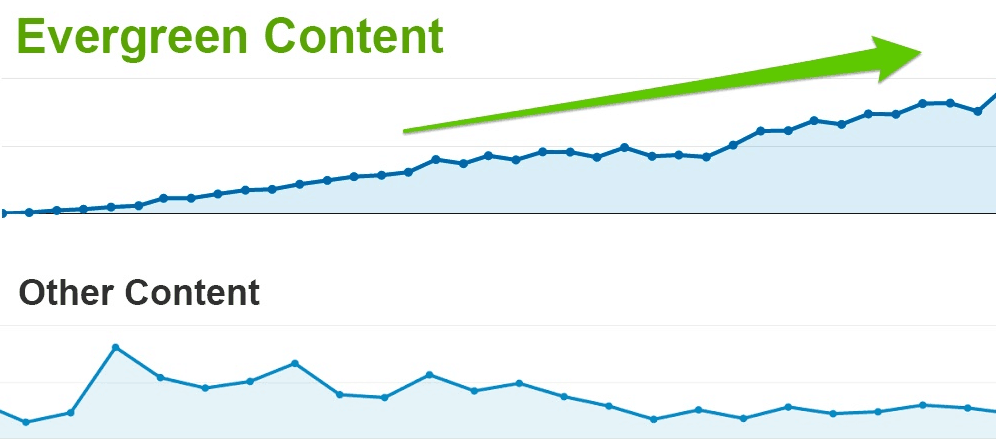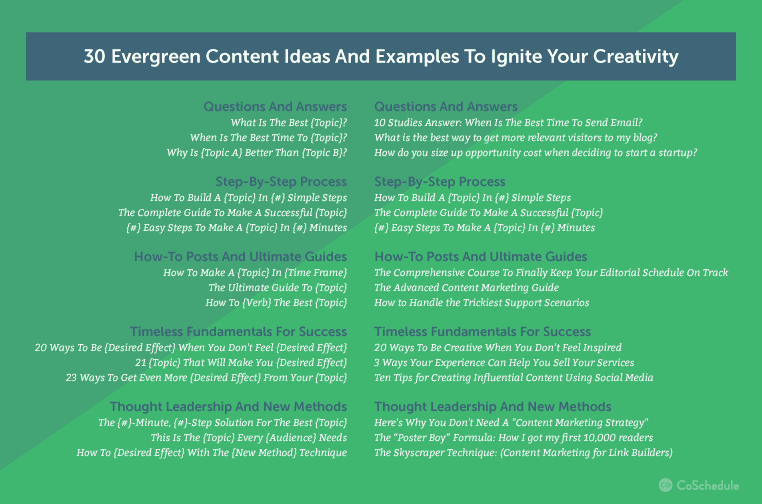Like all podcasters, you want your content to live forever. You want new listeners to find your episodes years after you publish. You may be on episode 575, but you still want new fans to enjoy episode 001. The only way to make your content last is by publishing evergreen episodes.
In this article, we’d like to explain evergreen episodes, lay out their benefits, and show you some examples. Study this advice to create podcast content that never stops working for you.
What are Evergreen Episodes?
An evergreen episode is a podcast episode that’s always relevant because it isn’t bound by time. It never goes out of date. Someone can listen to an evergreen episode at any time and still get value from it. They’ll never think, “This is outdated” or “This doesn’t apply anymore.”
Why are these kinds of episodes called “evergreen?” The term refers to evergreen trees that retain their leaves throughout the year. Evergreen episodes are valuable at any time.
You might be thinking, “Aren’t my podcast episodes available all the time? What does time have to do with it?”
Yes, your episodes will always be available for your audience to explore. They never disappear. But as the subject matter becomes less relevant, so does your audience’s willing to listen to those topics. By creating content that’s always relevant, you ensure that your fans (and new fans) will always be able to enjoy it.
If we plotted your downloads over time on a graph, evergreen content would look like this:

Here are a few examples of evergreen topics. These are evergreen because they will continue to be relevant in the foreseeable future. They aren’t bound by time.
- How to soothe a crying baby
- Losing weight with strength training
- What to do after you get laid off
- How to save for retirement
- Best date locations for a first date
- Growing your business with paid advertising
- What to expect on your first day as a teacher
The opposite of evergreen episodes are topical episodes. Topical episodes are only applicable for a short time. Their value decays over time. Eventually they become worthless because their topics are too far in the past.
These kinds of topics are not evergreen:
- News stories and current events
- Deep dives into recent reports, studies, statistics, or data
- Reviews of specific TV shows and fim
- Pop culture trends or fads
- Clothing and fashion trends
Benefits of Evergreen Episodes
Now that you know what evergreen episodes are, you might be wondering why you should create them. What are their benefits?
1. Consistent Publishing
You can create evergreen content at any time, even long before you intend to publish it. This is a great way to maintain a consistent podcast publishing schedule. You can record episodes in batches to create a backlog and boost your personal productivity.
2. Never Rush to Publish
If you create topical content, you have to rush to publish while the topic is in your audience’s mind. News coverage, for example, is often irrelevant in days or hours. Evergreen episodes are relevant forever, so you can take your time recording and editing.
3. Freedom to Take a Break
Buy recording ahead of time (which you can only do with evergreen episodes), you give yourself the freedom to take a break every once in awhile. You might create a queue or six or eight episodes so you can take a vacation. Or you might record an evergreen episode and save it for when you have an emergency or decide to take a sudden trip.
4. Great for SEO
Web searchers browse for evergreen content more than topical content. This means you can draw more traffic to your podcast website by creating pages for those evergreen episodes. Embed your podcast player, add your show notes and/or a complete audio transcript to instantly create SEO value and attract web traffic. These pages continue to collect traffic long after you publish the episode.
5. More to Binge
When a new listener discovers your show, he or she will want to binge on as much content as possible. When they come across outdated content, however, they’re likely to skip past because it doesn’t matter anymore. By publishing evergreen episodes, you ensure new listeners always have good stuff to binge.
6. Greater Appeal
Evergreen content generally appeals to more people than topical content, especially over long periods of time. For example, more people want to know about the “best action movies of all time” than the “best action movies of 2019.”
Creating Evergreen Episodes
Creating evergreen episodes may sound easy, but that isn’t quite true. In many cases, the best evergreen topics have already been addressed, sometimes excessively. Look for podcast episodes with basic how-to content and you’ll find countless examples of the same topics repeated over and over.
The key to creating highly valuable evergreen content, therefore, is to choose topics where you can add a unique angle or viewpoint. Perhaps you can find a unique guest who has special experience. Maybe you can provide additional details that other podcasters missed. Or maybe you have a way to tell a better story.
If you’re struggling to come up with evergreen topics, here are some places to look for inspiration.
- Listener FAQs. What do your listeners want to know about?
- Industry concepts or terms. Pull back the curtain and expose your listeners to something that only people like you tend to know.
- Case studies. Lay out how one person solved their specific problem.
- Biographies or profiles. Take a deep dive into someone’s life to see how they got to their point in life. These make great interviews if you can find the person.
- How-to guides. This works for beginners or advanced users. Just make sure you don’t focus on something time-bound (i.e., “How to attend this year’s SXSW conference”).

Image: CoSchedule
Whenever you create an evergreen episode, it’s critical that you examine other types of content that address the same topic. Don’t stop at podcasts. Examine blog posts, whitepapers, YouTube videos, and any other form of content that addresses your topic well.
Once you have the best content on that topic in front of you, ask yourself, “How can I make this topic better? What can I add to make it more valuable than anything else?” In blogging, this is called the skyscraper technique because you build something “taller” than anything else, but it works for podcasting as well.
Examples of Evergreen Episodes
To help you understand evergreen episodes and why they’re timeless, we’d like to show you some examples.
Tit for Tat (Radiolab)
This episode tackles the prisoner’s dilemma, a classic thought experiment that examines why people cooperate and betray one another. You’ll hear stories from the 1960s and even World War I, but the content of the show is evergreen. It’s relevant at any time.
The One with David Koepp (Scriptnotes)
In this episode, screenwriters John August and Craig Mazin interview legendary screenwriter David Koepp about adaptations, embargoes, books, and blockbusters. They discuss lots of movies and how they’ve changed over the years, but the episode is not built around one specific film or event.
Myths of Magic and Milk (Burnt Toast)
This episode takes a historical look at our complex relationship with milk, including some popular myths that just aren’t accurate. Even though this episode references past events, the subject of the episode is timeless.
You DON’T Have to Have a Car Payment (The Dave Ramsey Show)
In this episode, personal finance expert Dave Ramsey discusses why so many of us feel the need to finance a car and how that’s a rarely financially smart. His advice is good for anyone at any time, making it especially evergreen.
Beyond Evergreen Episodes
Evergreen episodes are powerful tools to connect with your audience and grow your podcast, but that doesn’t mean you should rely on them entirely. Topical episodes have their place as well.
For example, let’s say you host a podcast about filmmaking. You talk about the process of making movies and TV, the entertainment business, and how new people can get started in the industry. That’s all great evergreen content.
But when the Academy Awards come around, you’ll probably want to make an episode about it. That would be a topical episode because it’s linked to a specific event that no one will care about it in a month.
Nevertheless, it’s great content that your audience will love. People will be looking for that kind of content and may decide to stick with your show for the other great stuff. In some cases, avoiding current events can actually make your audience doubt your authenticity.
So while evergreen episodes are valuable content forever, don’t be afraid to weave in some topical episodes to your schedule. This will create diversity in your content so your listeners are always excited about what comes next.
What are your thoughts? Do you prefer evergreen episodes or topical content? Let us know in the comments.


